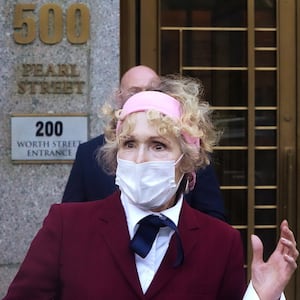Last Tuesday night, as election results slowly trickled in from across the U.S., an eclectic group of women came together for a Zoom call. They were of all different ages, from all around the country—conservative states like North Carolina, swing states like Ohio, reliably blue ones like New York. Most of them had never met each other. But they had one thing in common: All of them had accused Donald Trump of sexual misconduct.
Trump is the first American president to be accused of sexual misconduct by dozens of women, as well as the first to be caught on tape claiming he could grope women as he pleased. His 2016 election was seen by many as a step back for women’s rights, a symbol of the country’s tolerance for blatant misogyny. Naturally, his loss is being hailed as a beacon of progress.
But for many of the women on the Zoom call, it is also a rare moment of release.
“It was the first time in four years that I actually felt like I could really breathe deeply again,” said Karena Virginia, a yoga teacher from New Jersey who has accused the president of groping her in public in 1998. Virginia was in the grocery store on Saturday when she received the news that the election had been called for Joe Biden. It was, she said, “actually the first time I really felt safe.”
“It was a very interesting sensation,” she added. “I realized that for four years, I always kind of sensed that feeling of, ‘Am I safe in this public place?’ Just because there was so much anger.”
Natasha Stoynoff, a journalist who accused Trump of shoving his tongue down her throat at his Mar-a-Lago mansion in 2005, was in the remote Canadian woods when she heard the news. She saw the results on CNN and ran outside to scream her thanks to the sky, possibly waking a few hibernating bears in the process.
“For the first time in four years, I can breathe. I can sleep,” she said in an email, echoing Virginia’s sentiment. “For the first time in four years, I don't wake up wondering and worried, ‘What awful words has he tweeted while I was sleeping? What terrible thing will he do today?’”
“Relief is an understatement,” she added.
Nearly 30 women have publicly accused Trump of sexual misconduct, from walking in on them in one changing room to raping them in another—allegations that he strongly denies. For many of them, the last four years have been a living hell. Publicly identifying as a sexual assault survivor has its consequences, especially when the alleged assailant is the president and is telling everyone who will listen that you are an ugly liar. Certain clients stop calling; certain friends stop coming by; certain Christmas cards dwindle, replaced by hate mail from the president’s supporters. On the Zoom call Tuesday, accuser Samanta Holvey recalled, the women turned to each other and asked, “Oh yeah, you’ve also received death threats?”
A true yogi at heart, Virginia said she thinks this experience has made her a better person. (“I feel like we are on the road to empowerment in speaking truth and bringing healing to our country,” she said at one point.) But there is also a lingering hurt that she knows will last more than a single election.
“There’s a new feeling of safety, a new feeling of being able to find my breath again, but there is still some PTSD to heal,” she said. “The change in power did not take those feelings away. It didn't erase the last four years. It just gives me more hope.”
Holvey, a former Miss Universe contestant who accused Trump of walking in on her and other young competitors in their dressing room, has her own version of PTSD from election night 2016, when women around the country felt the rug pulled out from under them. While some of the other accusers were optimistic Tuesday night, Holvey was nervously pounding Cool Ranch Doritos, unsure that Joe Biden would prevail. She still hasn’t let herself fully relax, fearing that Trump will pull off another surprise victory by challenging the vote count in court. “I feel like there are so many tricks up their sleeves,” she said.
Other women said they, too, had nagging concerns, pointing to the fact that Trump had already installed a conservative majority on the Supreme Court and appointed almost a quarter of all active federal judges in the United States. There’s also the 55 percent of white women who voted for him again this year—a 2 percent increase from this infamously high support in that demographic in 2016.
“A lot of the damage is not going to be undoable, at least in the short term,” said Lisa Boyne, a health-food entrepreneur who accused Trump of looking up women’s skirts and commenting on their genitals at a dinner party in the mid-'90s.
"I think the part that really disheartens me more than anything is that 70 million people voted for him—another four, five million people than last election,” she added later. “That makes me feel like there's a problem in this country with facts, and who to believe, and the truth."
At the same time, there is a sense of hope about the incoming administration, not least because it will usher in the country's first female vice president. Just hearing Biden announce in his victory speech that he would soon appoint a COVID task force gave her a sense of relief, Stoynoff said. And when Kamala Harris took the stage to deliver her remarks, Holvey added, “it was just amazing to be able to listen to our elected leaders and not cringe.”
While Trump’s accusers may not have to listen to him for much longer, he will likely be answering to them for years to come. A federal judge ruled last month that the Department of Justice could not defend Trump in a defamation suit filed by E. Jean Carroll, a journalist who accused the president of raping her in a department store in the '90s. (“One of the happiest days of my life!” Carroll tweeted on Saturday, when the election results were called.) And a defamation suit filed by Summer Zervos, a former Apprentice contestant who accused Trump of groping her and kissing her against her will in 2007, will also likely continue when he leaves office.
On Sunday night, the accusers met again on Zoom, this time in a more celebratory mood. They delighted over the election results, took selfies, and made Women’s March-style posters. (Most of them bore some kind of “Girl power” message. Virginia, the yoga teacher, made one that read “May your soul heal.”) And they vowed to work together, even with Trump out of office, to change the culture around sexual assault and harassment in America.
The next day, Stoynoff tweeted a photo of the group and wrote, “From the women who spoke out about Donald Trump to the women of America: When women support each other, incredible things happen.”
Quoting the poet Maya Angelou, she added, “Into a daybreak that's wondrously clear, I rise.”


